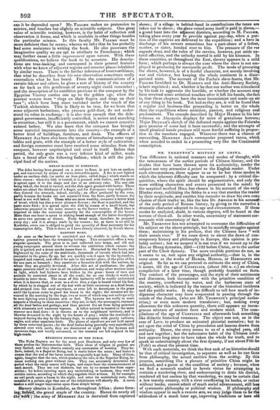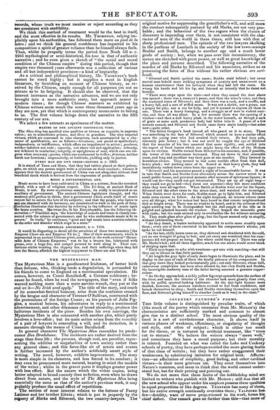MR. THORNTON'S HISTORY OF CHINA.
Tue difference in national manners and modes of thought, with the remoteness of the earlier periods of Chinese history, and the doubts that have been thrown upon its authenticity, render the subject not very attractive a priori to the English reader. Under such circumstances, there appear to us to be but three modes in which the inherent difficulty can be conquered : by a critical dis- quisition, where the spirit should be argumentative, and only the more striking characters and events presented to the mind; by the sceptical method MILL has chosen in his account of the early Hindoo story, exhibiting the fables in a way that startles the reader by their magnitude, and enables him instanter to draw his own_ co4,___ elusion of their truthe--or, like the Late Dr. AIMOLD in his see of the early period of Roman history, by giving to the narrative a. dramatic character adapted to its age and circumstances. If these modes be analyzed, doubt, in various degrees, will be found at the bottom of them all. In other words, uncertainty of statement cor- responds with uncertainty of facf.
Mr. THORNTON has not attempted to overcome the difficulties of his subject on the above principle, but he manfully struggles against them; maintaining in his preface, that the Chinese have " wyit their annals true." If we come down to about the dawn of con- temporary history and philosophy in Europe, this opinion is pro- bably correct ; but we suspect it is net true if we mount up to the Hea or Shang dynasties, 2205-1122 before Christ, or to the earlier part of the Chow dynasty. The more credible portions do not, as it seems to us, rest upon any original authority,—that is, in the same sense as the works of HOMER, Heston, or HERODOWS are original. So far as we can pretend to estimate the story of China, it seems, till the age of CONFUCIUS, (about 500 B. c.) an obvious compilation of a later time, though probably founded on facts. The conduct of the personages, and the style of their sentiments and discourse, look inconsistent with the primitive condition of the country, overflowed by water, and the barbarous state of society, which is indicated by the nature of the historical incidents and the public works. It may be difficult to tell how much of in- digenous character may have evaporated in passing through the minds of the Jesuits, (who are Mr. THORNTON'S principal author- rities,) or even more modern translators ; but, making every allowance for this unknown quantity, there still appears an incon- gruous mixture of ancient facts and modern mind. The com- pilations of the age of CONFUCIUS and afterwards look something like didactic historical romances. The object was not, as in the case of LIFT, to produce an animated pictorial narrative; but to act upon the mind of China by precedents and lessons drawn from antiquity. Hence, the story seems to us of a mingled yarn, old and new together; but the submissive habit of the Chinese intel- lect appears long since to have taken the whole for truth, and to speak as unhesitatingly about the first dynasty, if not about Etih-he (Fohi) as about the present time. With such materials, we think the first task of an historian should be that of critical investigation, to separate as well as he can facts from philosophy, the actual entities from the writing. By this process, something like a picture of primitive China might be adduced, and a guess at the condition of society ; because, when we find a monarch exalted to heroic virtue for attempting to restrain a wandering river, and endeavouring to drain his district, rendered all but useless by that wandering, we may be certain that a low marshy country, with a river overflowing its banks, or rather without banks, cannot admit of much social advancement, still less of systematic philosophy or political wisdom. If philosophy and wisdom appear in such a remote era, we may judge them to belliet addendum of a much later age, improving traditions or bare old
/records, whose truth we must receive or reject according as they awe consistent with erffldibility.
We think this method of treatment would be the best in itself, and the most effective in its results. Mr. THORNTON, relying im- plicitly upon his authorities, has followed them more au pied de la lettre ; and we think his general confidence has imparted to his composition a spirit of greater reliance than he himself always feels. Thus, whilst be properly terms the period from Noah till B. C. 2205 mythological or semi-historical, his tone is that of authentic narrative; and he even gives a sketch of "the social and moral condition of the Chinese empire" during this period, though that empire two thousand years afterwards was a collection of various and all but independent provinces—a kind of heptarchy. As a critical and philosophical history, Mr. THORNTON'S book cannot be rated highly ; but it supplies a want in English litecature, by furnishing an account of Chinese history, as re- ceived by the Chinese, ample enough for all purposes yet not so minute as to be fatiguing. It should also be observed, that the interest increases as the narrative advances, and we are not only brought into a more authentic story, but approach nearer to modern times ; for though Chinese manners as exhibited by Chinese writers seem much the same three thousand years ago as they are now, yet that which is contemporary seems more to belong to us. The first volume brings down the narrative to the fifth century of our mrs.
We select a few extracts as specimens of the matter.
MAXIMS OF THE ANCIENT HISTORICAL TIME.
The Shoo-king has specified nine qualities or virtues as requisite in supreme ruler.; six in subordinate princes, and three in grandees. The nine imperial virtues, which are expressed in nine characters, each accompanied by a cha- racter of qualification, are as follows—Greatness, not proud or apathetical ; independence, or indifference, which offers no impediment to action ; goodness, neither indolent nor rude ; capacity, not above toil and application ; urbanity, not deficient in resolution ; integrity, or uprightness of soul, which can use dis- guise when necessary ;genius, which can condescend to bilks; firmness, neither harsh nor ferocious; magnanimity, or fortitude, yielding only to justice.
EVERY MAN HIS OWN PRESS—BEFORE H. C. 2205.
It is stated of Yaou and Shun, that they had tablets placed at their palace- gate, on which any person might write a criticism on their conduct ; whence it appears that the ancient government of China was not altogether without that beneficial check which is derived from the expression of public opinion.
MUSIC A GOVERNMENTAL ART.
Musk seems to have been cultivated in China as a science, from the remotest period, with a sort of religious respect. The Ya-king, or ancient Book of Music, is lost. By some mysterious association, its study is inculcated as an auxiliary of government. The ancient Chinese legislators thought, and the moderns still profess to think, that a government which avails itself of music cannot fail to secure the love of its subjects ; and that' the people, who listen to MIT are. charmed with its harmony, are constrained to walk in the path of duty. 4.reonfuciva illustrates this doctrine by referring to the influence of music upon 11 he brute, creation. Ma-twan-lin, in his Encyclopaedia, has the following ob- servation--" Tradition says, the knowledge of sounds and tones is closely con- nected with the science of government, and he who understands music is fit to govern.' In truth," he continues, "good and bad music have a certain relation to the order and disorder which reign in a state."
IMPERIAL AMUSEMENT, B C. 1154.
It would be disgusting to detail all the atrocities of these two monsters [the Emperor Chow-sin and Empress Tli.ke.] One of their amusements, which is represented in an ancient Chinese print, contained in the work entitied"Memo- Table Acts of Chinese Emperors," was to lay a brazen bar, lubricated with grease, over a huge fire, and compel persons to walk along it. Their con- tortions whilst treading the slippery bar, and their sufferings when they fell into the flames, afforded the highest enjoyment to Chow-sin and TI-ke.



























 Previous page
Previous page